
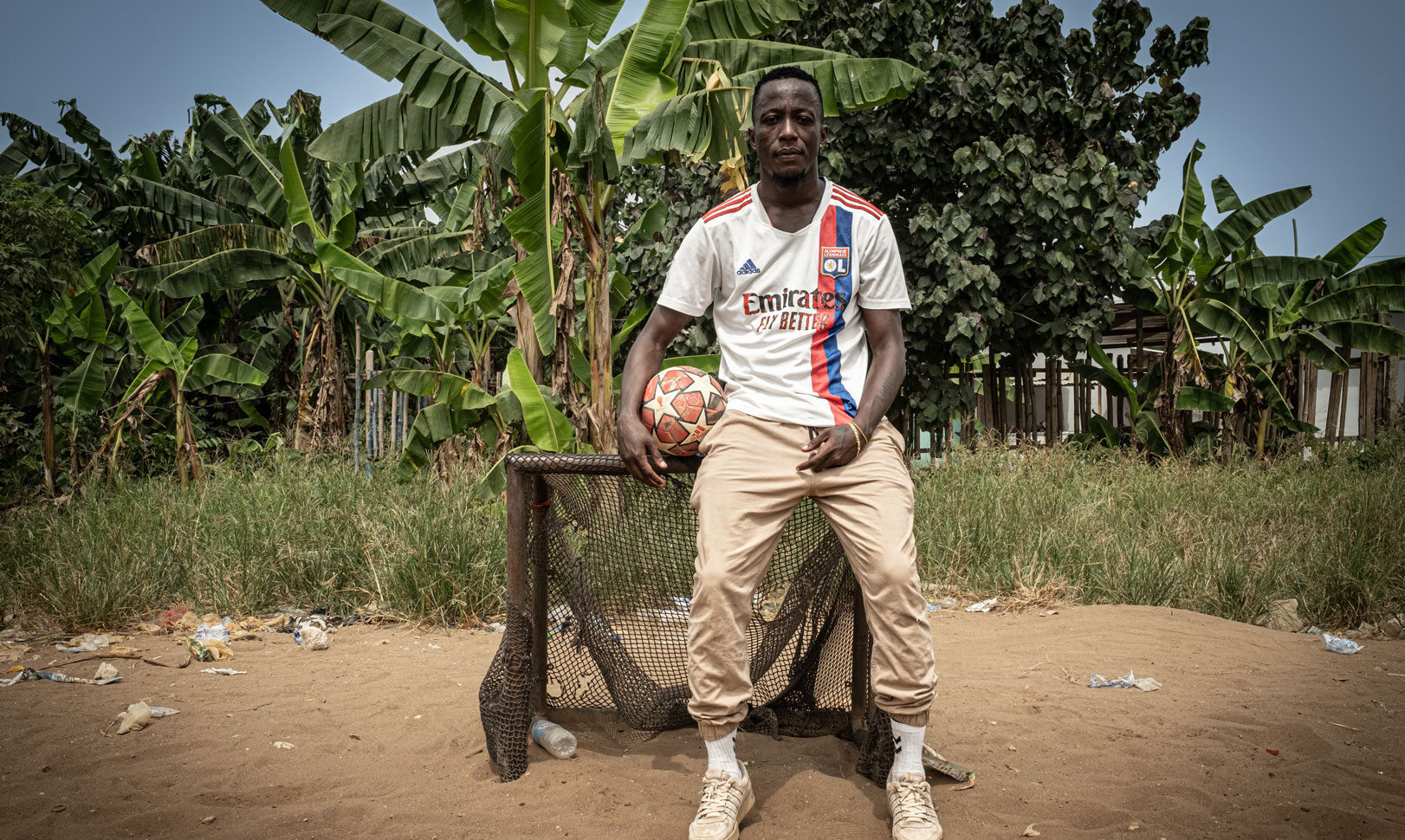
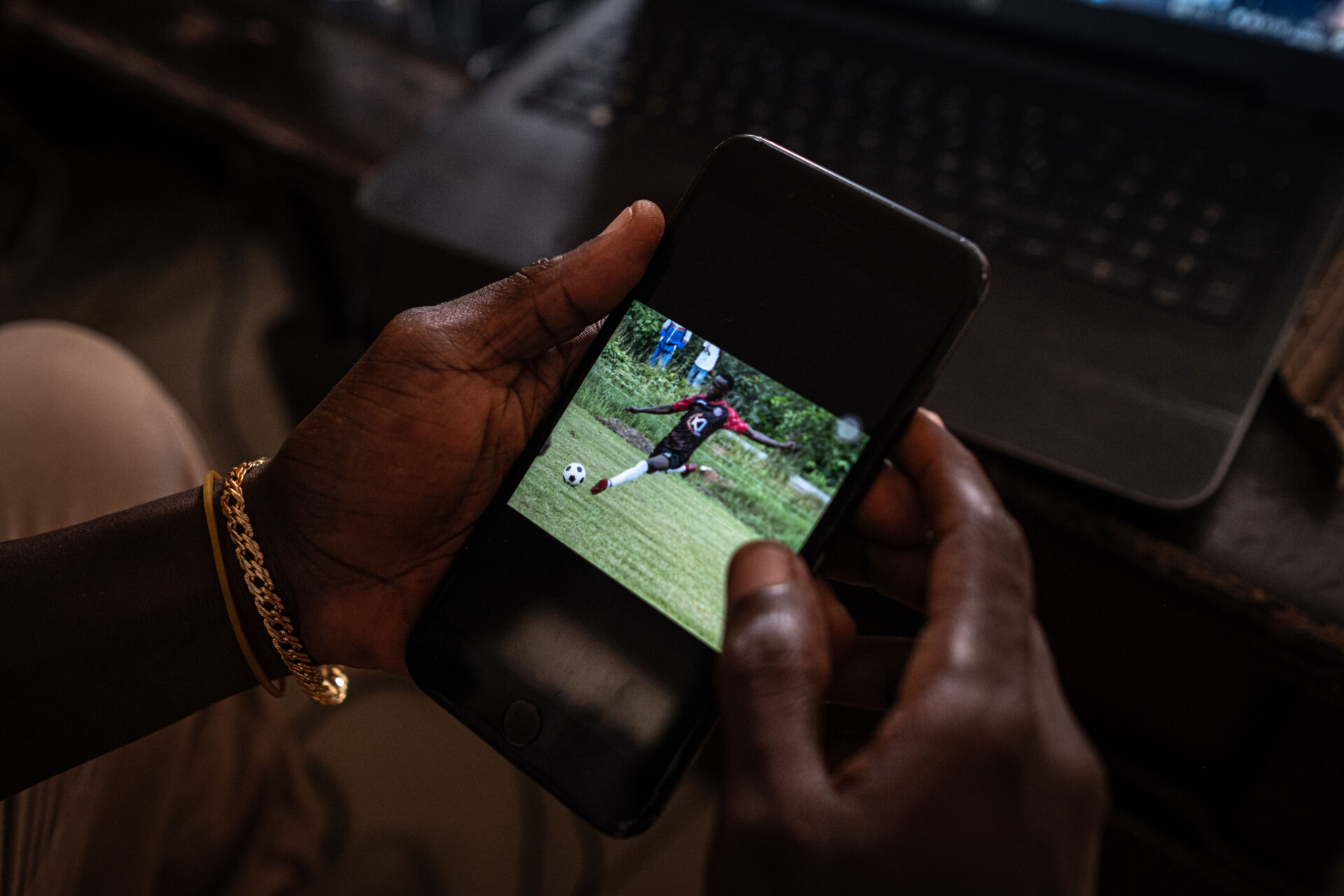
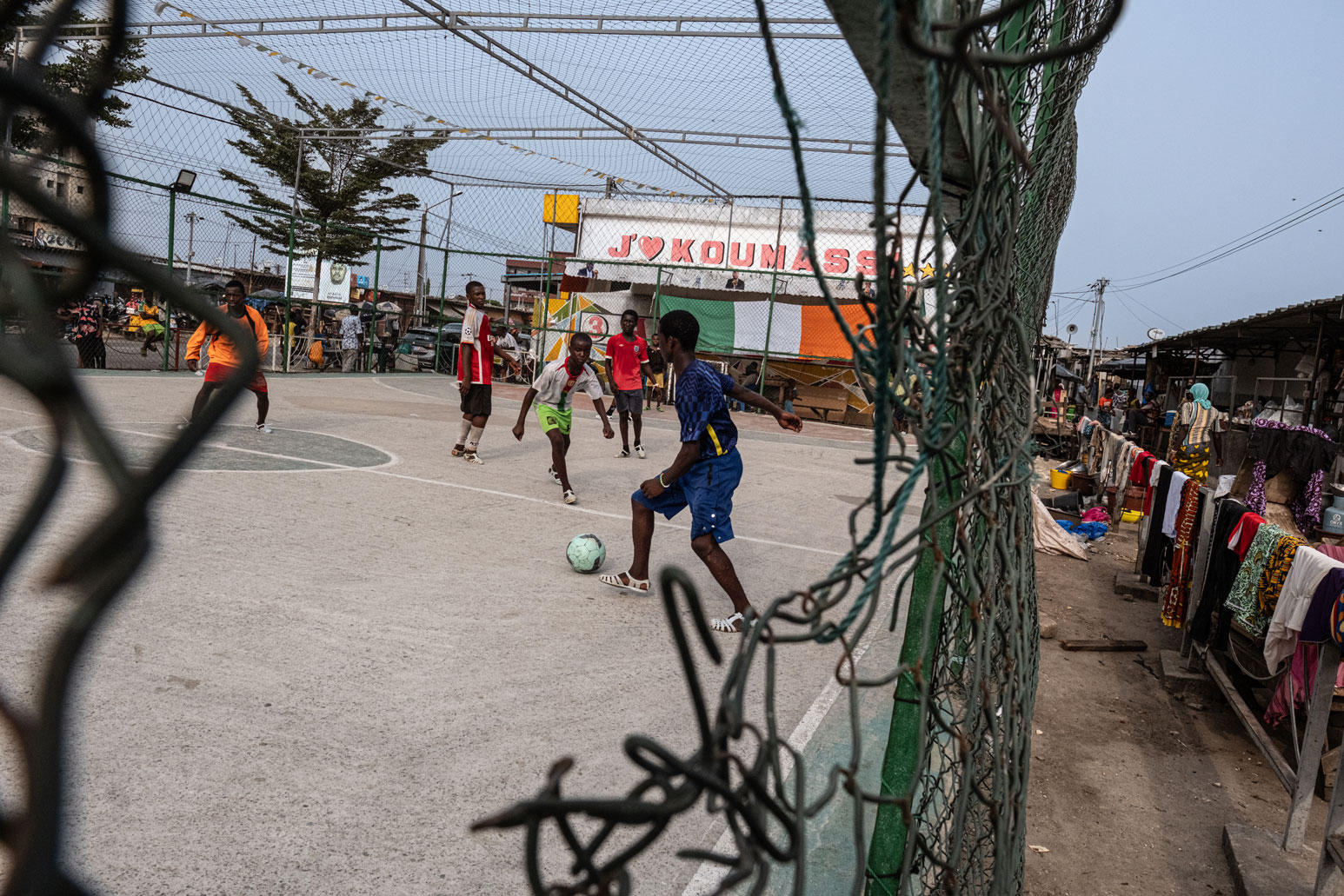
They Were Trafficked Instead.
They Dreamed of Making It Big in Soccer. They Were Trafficked Instead
Thousands of aspiring African players are duped and exploited every year as they try to land spots on professional teams abroad
Listen to this story
It’s a busy evening in mid-January, and Serge, 31, is taking yet another fare from one part of Abidjan, the bustling economic capital of Ivory Coast, to another in his white Suzuki taxi. As they cross the Charles de Gaulle bridge, which connects the working-class neighborhood of Treichville to the rich one of Plateau, he looks over at a skyscraper, situated not far from Felix Houphouet Boigny Stadium, one of the city’s grounds that is hosting the Africa Cup of Nations (AFCON) soccer tournament. The flags of the participating nations are projected onto it.
As the sun goes down, the traffic abates and Serge grows more relaxed and talkative, telling New Lines about his deep and abiding passion for soccer. The game between Congo and Zambia is about to begin; he will listen on the car’s radio. That’s how he has followed many of the matches, including the second half of Ivory Coast’s debut match against Guinea-Bissau. Though he had bought himself a ticket and was cheering in the stands, he says the draw of so many potential fares — more than 1 million soccer fans descended on Ivory Coast for the tournament — drew him back to his cab at halftime. Serge left the stadium with sadness. Not only would he have wanted to follow that and other matches live, but his dream, until a few years earlier, was to be on the field for such a game.
“I loved playing soccer. I dreamed of soccer, I ate soccer and I breathed soccer. I even left school because of soccer. It was my whole life,” Serge tells New Lines. He was born and raised in the Abidjan municipality of Yopougon, better known as Yop City, a mix of residential and industrial neighborhoods where more than 1.5 million people live in close and sometimes chaotic quarters. Unlike other areas of Abidjan that welcome many immigrants from various West African countries, Yop City’s residents are mostly Ivorian, and the city’s culture — especially its obsession with soccer — pulses through its streets. It is the birthplace of an outsize number of soccer talents who have come up through the pitches and clubs there.
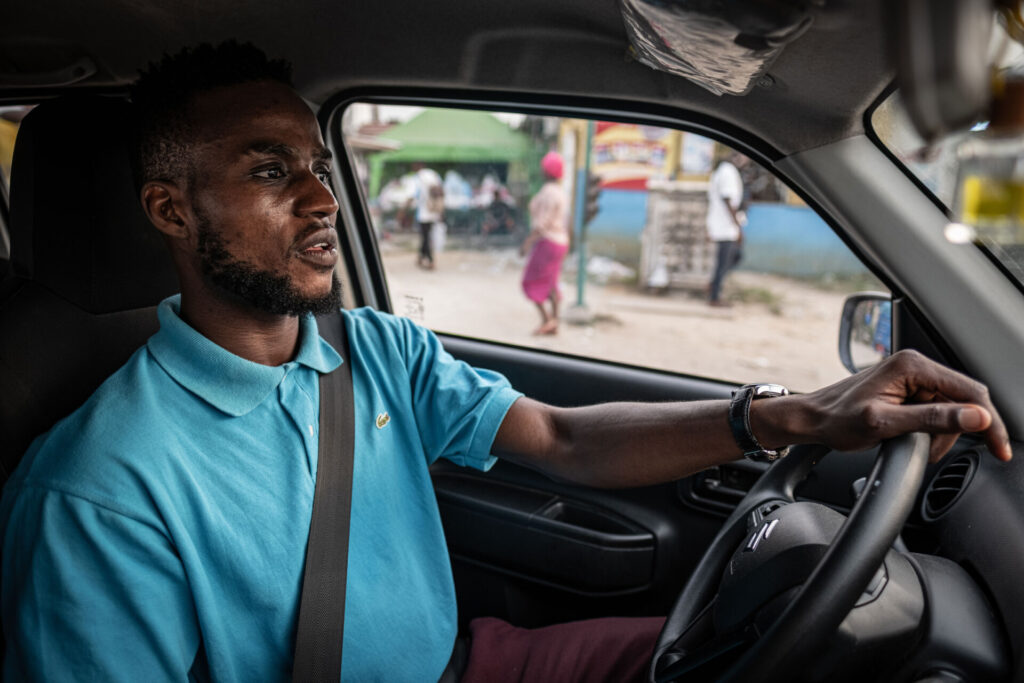
One of those stars is the two-time African Ballon d’Or winner Didier Drogba. The former icon of the famous Chelsea team in England was the captain of the Ivory Coast national team when it qualified for the World Cup for the first time in 2006. Drogba retired in 2018 but remains one of the biggest idols for aspiring African players whose goal is to reach Europe, the continent where some 60% of the players who were called up for the last AFCON play or trained. Their ranks included Mohamed Salah, the dazzling Egyptian striker who plays for Liverpool in the English Premier League, and the Nigerian striker Victor Osimhen, who led the Italian Serie A League in goal scoring in 2023, playing for Napoli, and was named African player of the year in December by the Confederation of African Football.
The importance of African players in elite soccer leagues has grown dramatically in the past decade — now some 500 Africans play for top-flight European clubs, with hundreds more playing in leagues in the Middle East and Asia. They have become a vital part of one of the largest sports industries in the world: The European soccer market alone was worth $31.8 billion in 2023. As those leagues search for their next megastars, tens of thousands of young players in Africa are trying desperately to get seen in the hope of escaping poverty, unemployment and political instability. And that combination of desperation and potential stardom is ripe for exploitation that comes in many forms — including trafficking, when people pretending to be agents collect money from hopeful players and their families but don’t deliver on their promises.
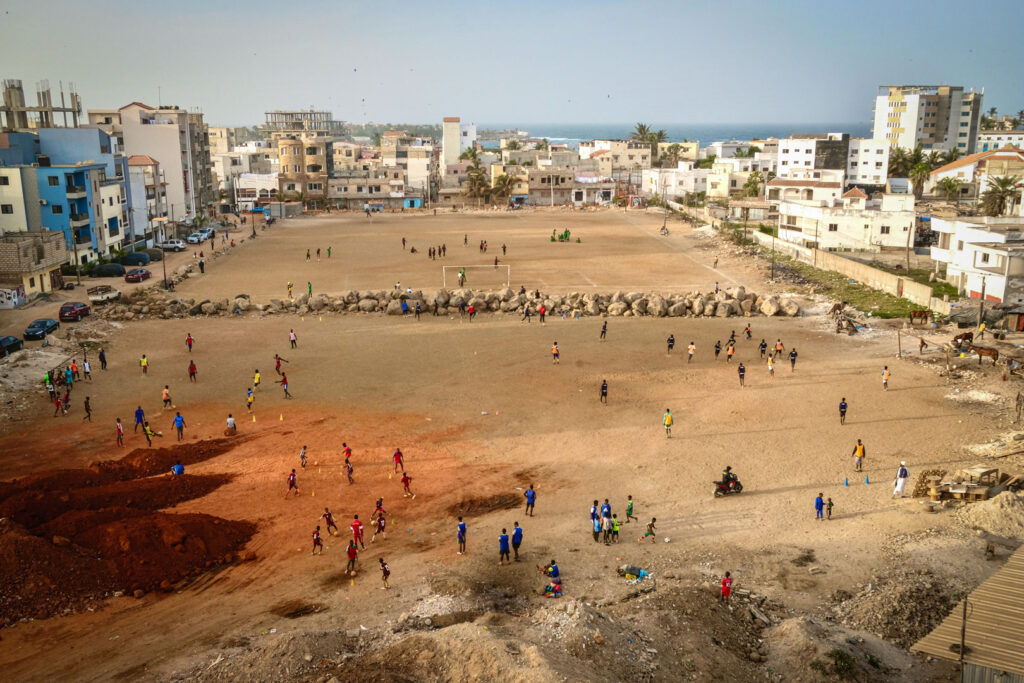
When he was 13, Serge was recruited by an “agent” to travel to Burkina Faso to play a test match in Ouagadougou where, the person said, European scouts would be watching the game. Aware that this could be a major break for the talented young player, Serge and his family pulled together the asking fee — about $165, a major stretch in a country where the average monthly salary is around $550 and, according to the World Bank, 40% of the population lives below the poverty line. Other young players paid the fee as well and took the long, hot bus ride to Ouagadougou. But at the much-hyped match, no recruiters were in the stands. “I don’t know if it was a case of football trafficking. I just know that no one was there,” Serge says. “We ended up playing against small clubs and came back home.”
Serge’s case is no exception — an estimated 15,000 young players are trafficked every year. And it isn’t just unknown dreamers, like Serge, who have fallen victim to ploys. In the heady post-final press conference after Ivory Coast snatched the AFCON title, Simon Adingra, one of the protagonists of the host nation’s win and the best young player of the tournament, revealed that he had also been a victim of football trafficking.
After a supposed coach saw him playing in a local club and suggested he needed real training to make it big, the Brighton and Hove Albion player’s family paid the man about $300 to send Adingra, who was just 12, to a soccer academy in Benin. But once there, the “coach” disappeared with the money, and the horror of their reality set in: Not only was there no academy, but there was also no accommodation for the group of about 10 young boys who were dumped in the city and left to fend for themselves. The boys banded together, working menial jobs in exchange for food or money, waiting and hoping for a real opportunity. It would be months before a Beninese man, who had studied in Ivory Coast and met the boys on the street, helped Adingra and the others find decent accommodation and some opportunities to play. Eventually, Adingra managed to attract the attention of the Right to Dream soccer academy in Accra, Ghana, where he trained before being recruited — genuinely this time — to play in Europe by the Danish soccer club Nordsjaelland, which runs the academy.
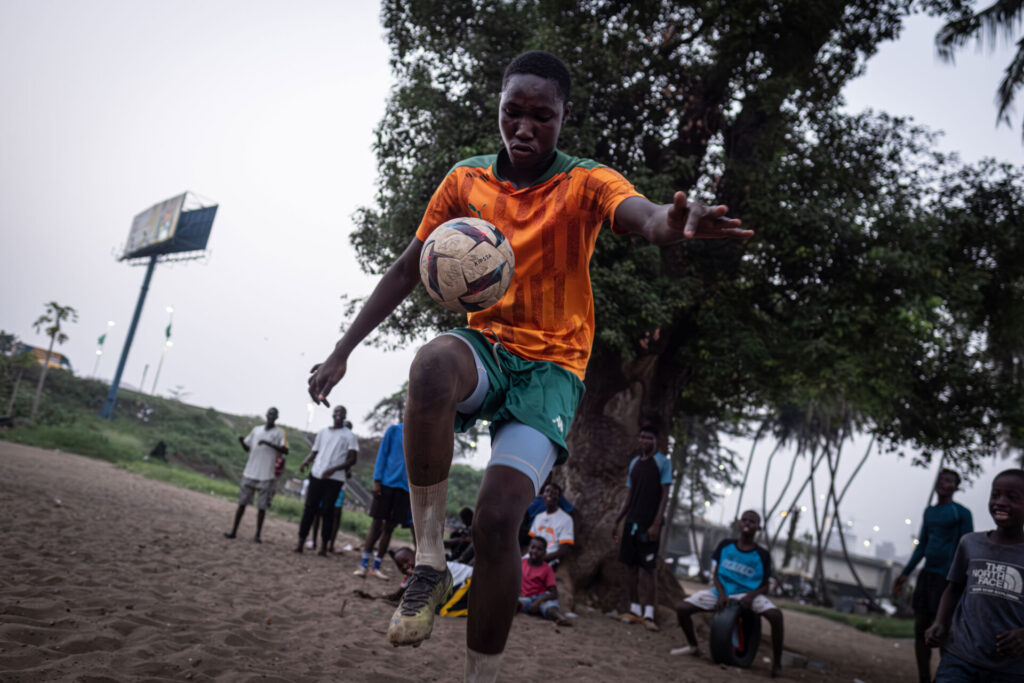
FIFA, the body that governs professional soccer, has a rigorous set of rules about recruiting players across borders at both the amateur and professional levels. They should be assigned an electronic ID registered with the governing body and have an invitation letter from the interested club that comes through the local federation, explains Alexandre Kouakou, a well-regarded agent in Ivorian soccer who raises awareness of scams and helps players recognize fake letters of invitation.
The rules are even stricter for minors hoping to make it to a big league. Though young players can be scouted and signed before they turn 18 in the country where they live — a practice common in the U.K., where tweens and teens regularly ink deals with domestic teams — international transfers are allowed only in rare exceptions for those under 18 and come with a bevy of restrictions: Minors can try out with a club only in a season when they are 16 or 17, and the club has to obtain express written permission from young players’ parents, provide the players with optimum accommodation, living standards and adequate coverage of expenses, and make sure they have a handler on the team. Above all, soliciting or collecting fees related to a tryout are off–limits. “It goes without saying that any operation carried out outside the official channels of the football institutions is to be considered at least suspicious, if not completely illegal,” Kouakou says.
But while most young hopefuls can reel off the stats about their favorite clubs or players and know the rules of the game intimately, few if any know the rules or statutes of the FIFA recruiting process. So when a supposed coach or agent comes along with an acute interest in a player and an enticing offer, many take their chances.
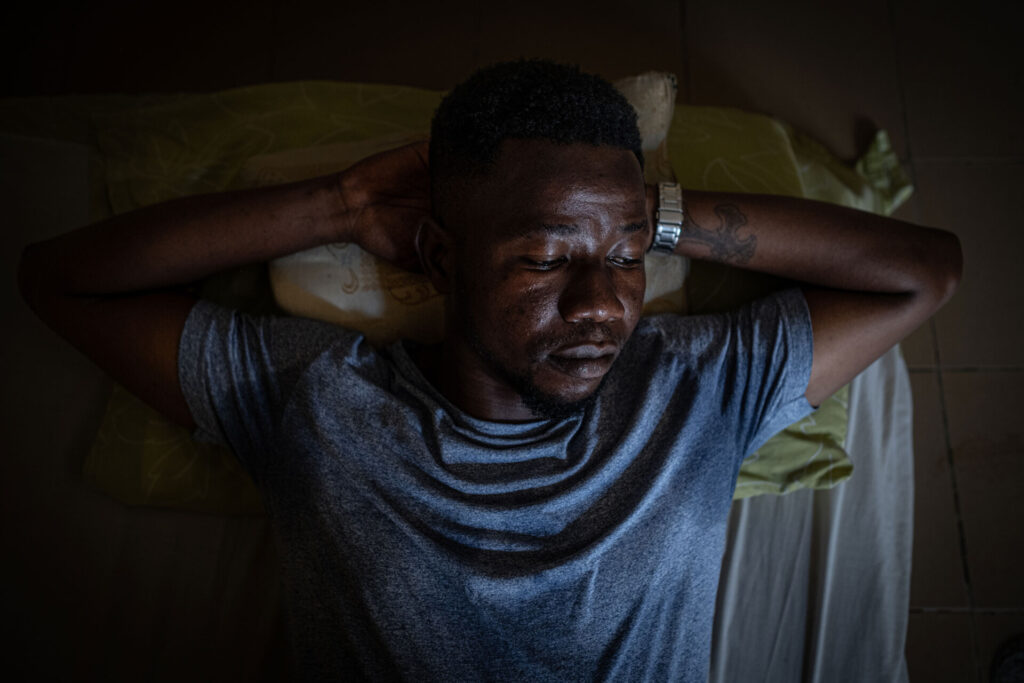
The ploys usually start with a supposed agent or scout in the player’s home country identifying a young, talented player and offering the boy the chance of a lifetime — to try out for a team abroad. There’s a catch, though — the agent needs a finder’s fee or perhaps money to secure a visa and accommodation while the tryout takes place. In his study of the industry, researcher James Easson lays out what happens next: Many families sell possessions, take younger children out of school or borrow money to raise the funds to send their child to the tryout. Upon arrival in the new country — the young players usually travel on short-term tourist visas — the agent will hold their passports and any money they have “for safekeeping.” For some, that is the end of the road, and the agent will simply disappear with their cash and papers, with no matches played. Others may play in games, and some are even offered contracts. But those are often exploitative, with massive cuts for the agent and little protection for the players. If no contract is secured, the agent makes off with the player’s remaining cash and papers.
Sometimes, however, the agent isn’t looking for quick cash, and potential players find themselves in even more precarious situations. In the early 2000s, the future English Premier League player Alhassan Bangura was trafficked to the U.K. from Sierra Leone by a Frenchman promising him a shot at the big leagues. Shortly after they arrived, Bangura, then just 16, was sexually assaulted by two men at the accommodation the Frenchman had arranged for him. Others arrive at their destination to be forced into manual or other types of labor. One former aspiring Nigerian footballer whom we interviewed, now based in Italy, was also attracted by the promise of a tryout in Europe but ended up in Cape Verde working as a poorly paid waiter.
The scammers can be incredibly sophisticated, refining details that dupe even the savviest of players.
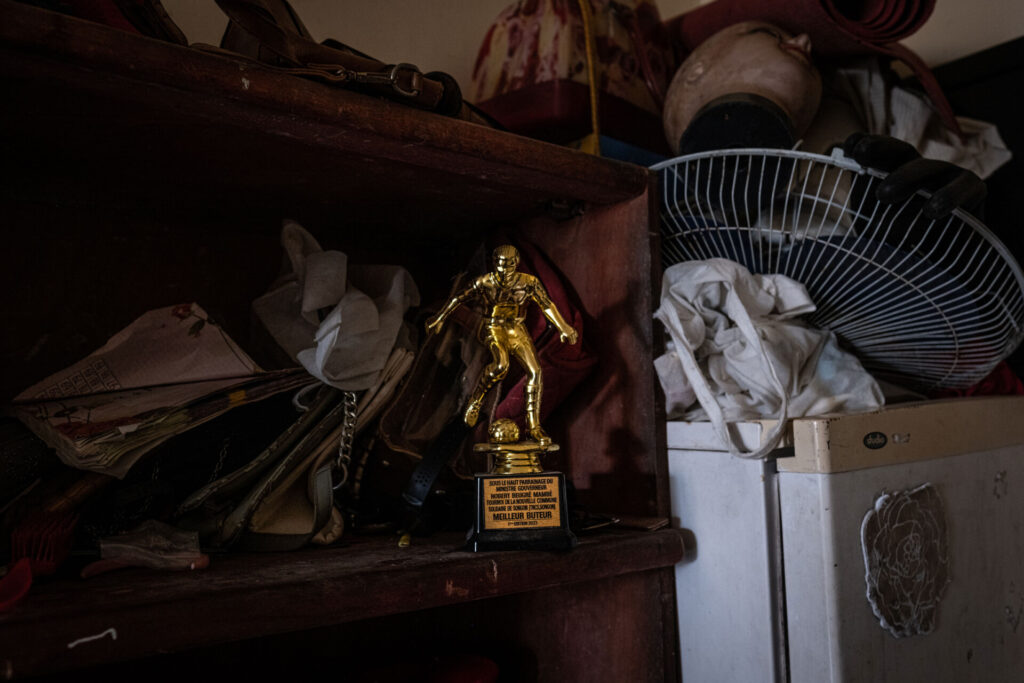
When David Kevin Kouassi, a 22-year-old player from Yopougon, was approached by a Moroccan man who claimed to be a FIFA agent and presented him with an invitation letter from a supposed Philippine club, he was initially suspicious — he had heard of people being scammed through fake letters. But his doubts were assuaged when the agent set up video calls with a man claiming to be a club representative, and an internet search of the agent’s name turned up a listing on the FIFA website. Confident in the offer, Kouassi paid $270 for the letter and headed to Manila.
After a tense discussion at border control in the Manila airport, the local authorities explained to Kouassi that he had been scammed. The fake agent had used a legitimate scout’s name and details to earn Kouassi’s trust but made off with his money instead. The player entered the country on a tourist visa anyway, and tried to find a contract himself, but the wages offered to him by first- and second-division clubs were barely enough to pay the rent. “I felt despair because I looked at the situation of my family back home. They were counting on me,” he says as he gets off a tuk-tuk a few yards from the apartment he rents with his sister in Songon, a rural suburb east of Abidjan where half-built concrete block houses sprout up from lush vegetation. When the economic situation in Manila became unsustainable, Kouassi found the courage to tell his father the truth and somehow scraped together the money to buy the return ticket.
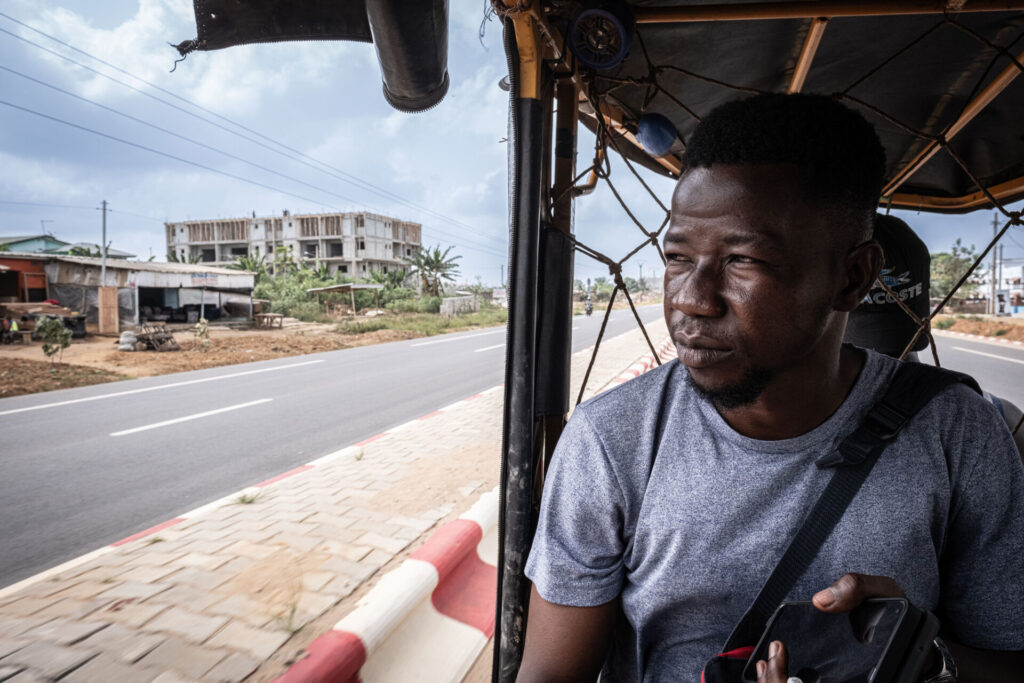
Almost all of the estimated 15,000 victims of soccer trafficking each year come from West Africa, a region where instability and an unbridled passion for soccer create fertile ground for trafficking networks.
“Every time we have meetings on football trafficking,” says Lerina Bright, president of Mission 89, a Swiss organization that specifically deals with sports trafficking, “at least three people raise their hands once they understand what football trafficking is about. Either they have been a victim or know a victim.”
Even if a young talent is playing at the professional level locally, the disparity between their salary — the average professional player in Ivory Coast makes around $500 a month — and potential earnings, even in the amateur divisions of European soccer, is enough to compel them to take risks to make those teams, whether it is trusting a dodgy agent or even trying to get on a small boat bound for European shores. If they don’t make it to Europe, many teams in North Africa, where the local infrastructure and leagues are more developed, offer salaries in the four- to six-figure range per month.
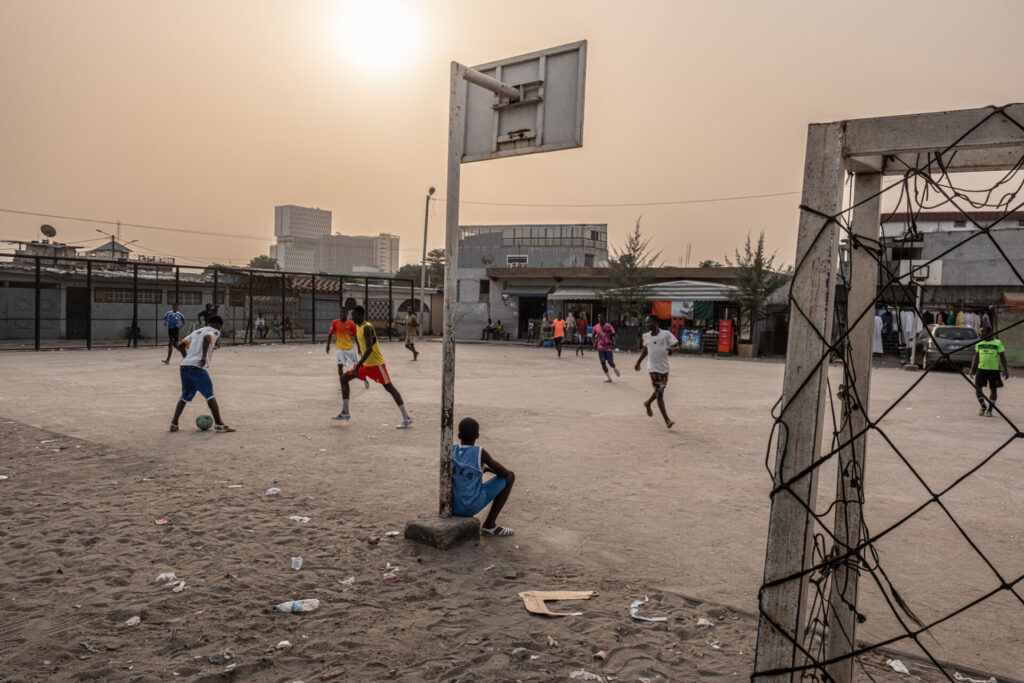
“What is missing in Ivory Coast is funding,” says Lakoun Ouattara, an activist from Abidjan who raises awareness about football trafficking with the nongovernmental organization Mousso Foot. “We need the state and club presidents to invest in infrastructure and improve local soccer. Until this happens, people will continue to leave for more developed footballing countries.”
When Ivorian players are transferred abroad, Ouattara explains, it also helps develop soccer locally — the money earned from their sale can contribute to teams’ growth, and having players operating in more competitive leagues improves those who will eventually be able to enrich the Ivory Coast national team on the world stage. “But the reality is that the country is facing an exodus which may lead people to pay less attention when presented with an apparent good opportunity,” he points out.
Daniele Canepa, an expert on football trafficking and author of the book “To What Extent? International Trafficking of Young Athletes,” adds that people often tend to point the finger at fake agents, but thinking that they are the only problem is like thinking that the drug problem is the guy selling joints on the side of the road.
“It’s a systemic problem,” he stresses. “The underlying question is how the human being is considered as a sportsman. On the one hand, we tend to think of athletes as machines that must perform. On the other hand, there is the commodification of the player, which in this sector is more accepted than in others where it would cause indignation.”
The International Federation of Professional Footballers (FIFPRO) has a section on its website dedicated to — and periodically conducts awareness campaigns on — football trafficking.
“This isn’t enough,” says Bright, the Mission 89 president. “Soccer institutions and governments all over the world aren’t doing much to eradicate football trafficking. At the moment our biggest ongoing project is to advocate for the crime of sports trafficking to be established and antitrafficking laws to be approved at European level. Real political will is needed, but often there is little concrete apart from proclamations.”
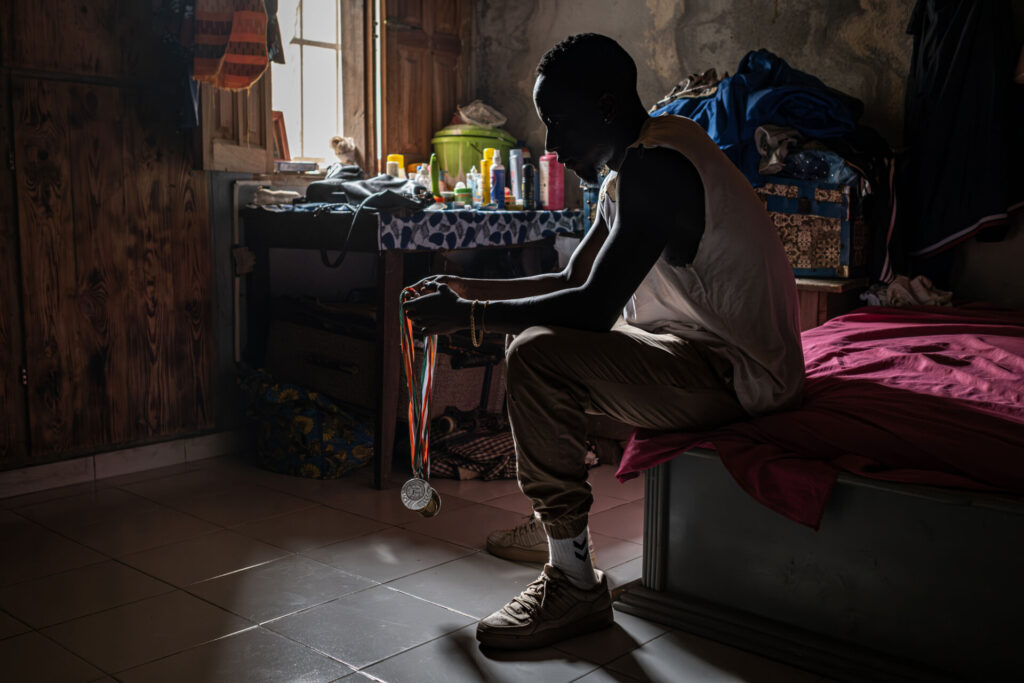
Adingra is not the only Ivorian to make it big despite being trafficked. In 2017, then-teenagers Amad Diallo and Hamed Junior Traore, now midfielders for Manchester United and Napoli respectively, were smuggled into Italy as brothers by a group of adults posing as their relatives. Several years later, an operation by the Italian authorities focused on sports trafficking uncovered the tangled web of connections that enabled the smuggling; the Italian soccer federation fined both players $52,000 for their part in forging documents.
Junior Traore and Diallo have been reluctant to talk about it. “In some cases the victims consider the shady people who scammed them as saviors because they brought them to Europe anyway,” Canepa says. “In other successful cases, if the players realize they have been trafficked, what reason do they have to make it known how they got there?”
Unlike many, Armel Djaoum, 27, wants to talk about his experience. “I think God made me live this experience so I could be a witness to it. I paid for my dream because I wanted to shake things up and get into the right business. I don’t regret anything,” he says while walking through a soccer field in Gravier, Songon. It’s a small lot with sandy soil that stands between a banana orchard and a modest inn where a few guys are chatting and drinking Coke. Grass on the sides of the ground defines the playing field, and the goals are made of rusty iron pipes, their nets placed imprecisely.
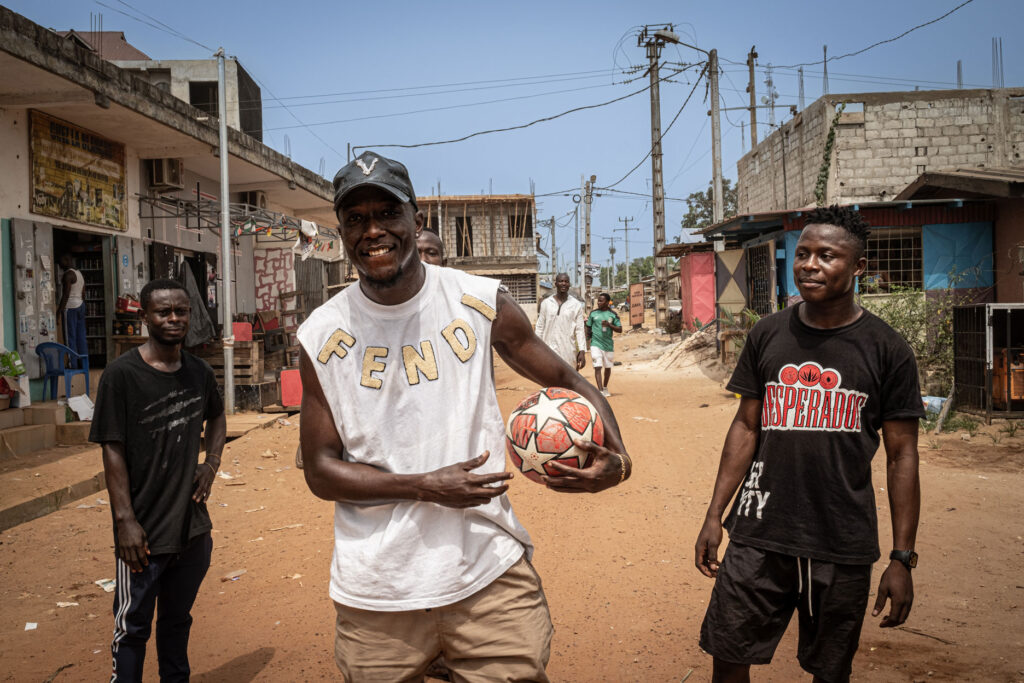
“This is where I started kicking a ball for the first time,” Djaoum says. “It was my whole world.”
Djaoum says that when he was 19, he was approached by a Cameroonian agent who recruited players from West African countries and sent them to Morocco to have a tryout with a third-division club. He paid about $2,100 for the opportunity, but the tryout never happened. Without the money he needed to return home, and still hoping to land a trial at a club in one of Africa’s biggest soccer nations, Djaoum stayed in Morocco illegally for a couple of years until his father, who had been supporting him financially, fell ill. Djaoum appealed to the International Organization for Migration for voluntary repatriation so he could be by his father’s side before his death.
But when he landed back in Ivory Coast, the social stigma of having left with big ambitions and returning with nothing hit hard. “The people of my village expected a successful player and instead they found a person with no money who had disappointed them,” Djaoum recollects, sitting on the sofa in his sparsely furnished house. “People started not taking me seriously, and when I went to train they made fun of me. They hurt me, but they didn’t know what I went through.”
The shame and fear of reprisals from scammers run deep among those who have been trafficked and perhaps contribute to the underreporting of cases, says Bright.
Serge had never shared his story publicly until now because of such fears and complex emotions — particularly because he had fallen victim to traffickers twice.
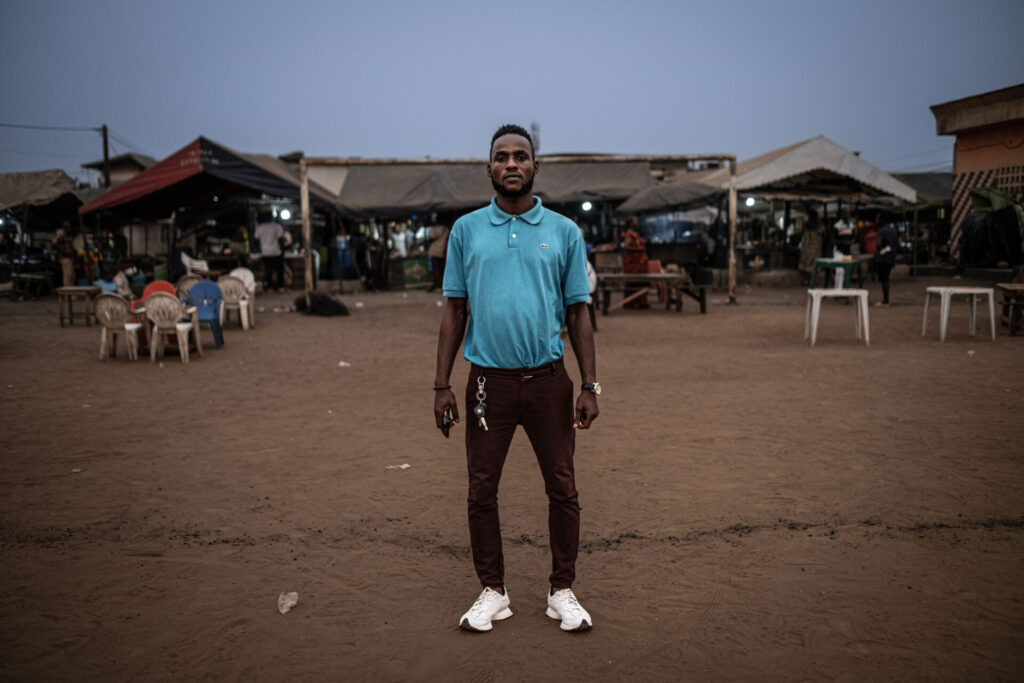
The second incident happened when he was 16 and playing for an amateur soccer club in the northern part of Abidjan. An Italian man showed up from time to time at the club training ground bringing balls, jerseys and other soccer equipment. No one knew what his role was. But one day, the man made a proposition to the team of around 30 players: Come play some trial matches in Italy, get noticed, perhaps get recruited. The fee was close to $5,000, a staggering amount of money. But the players’ families were excited and started looking for funds. Serge’s mother asked for loans from several relatives but was unable to raise the requested sum. No matter — players who couldn’t raise their share were offered a spot on a trial in Ghana for a lower price. There, Serge and the other boys who hadn’t been able to finance the trip to Italy would play test matches while waiting for their families to raise enough money to join the group that left for Rome.
Serge went to Ghana, but the matches turned out to be simple friendly games with local teams. No scouts were present to observe the players. Serge’s family never managed to scrape together the money to send him to Italy, and he returned home empty-handed once again.
“I believed a lot in the opportunity in Ghana, because my mom had given everything for me to succeed,” Serge says while watching two teams of young boys competing in a dirt soccer field in Yopougon where players are sometimes recruited.
Sitting in an outdoor cafe, he explains that his mother used to take him to training before going to work and pick him up after she finished, spending much of what little money she had on transportation. “Before she passed away, she said I was going to go to Ghana to then be able to open my way to another country with greater opportunities, but I couldn’t make her dream come true.” The scams and other unsuccessful trials took a tough toll financially and emotionally on Serge and his family. He eventually decided to quit soccer after he started his own family in order to find a more secure job and be able to support his children.
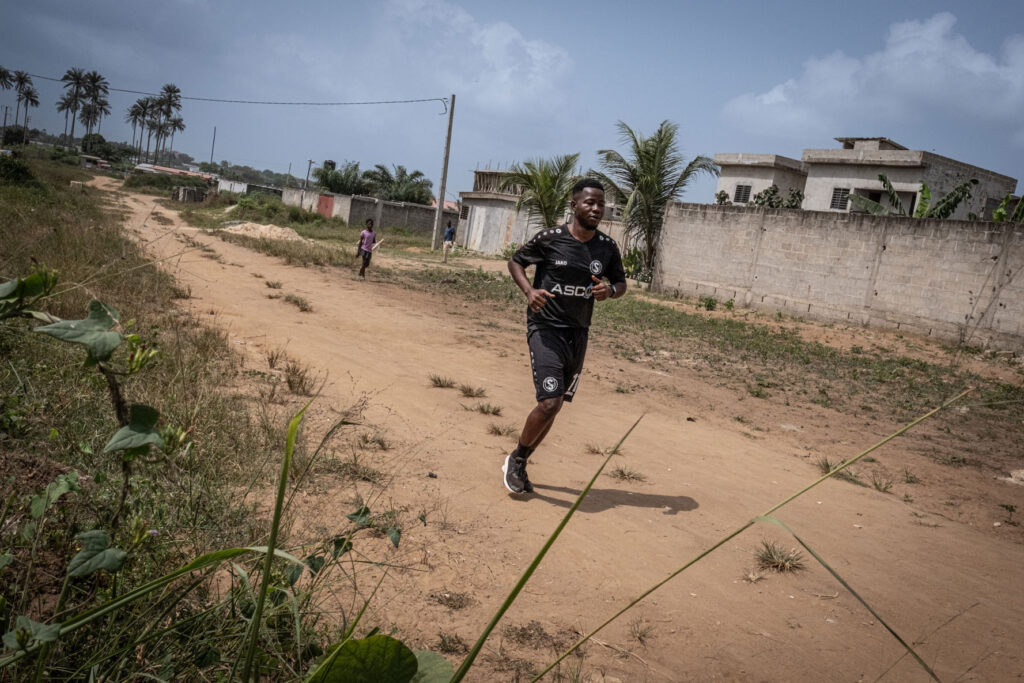
After his ordeal in the Philippines, Kouassi returned home. To his astonishment, he was welcomed and supported by his family. It has given him the strength to move forward and continue to pursue his dream of becoming a professional player. Despite his young age, Kouassi avoids going out too much in the evening and is committed to living a healthy lifestyle. He recently joined Yopougon F.C., a third-division club, where he plays for a small stipend that doesn’t even cover his transportation to practice or games. He has no intention of giving up, and his goal is to reach Europe.
“Every day I cheer myself up,” he says while getting ready to go for a run. He grabs his soccer cleats and points to a trophy that he won when he was a teenager, propped on a jumbled shelf. He takes it in his hand and underlines that, as long as his body responds, he will keep trying his luck. “Cristiano Ronaldo is 39 years old and continues to play. Why can’t I do the same? I want to keep playing until I feel weak, until I can’t shoot the ball anymore.”
All photographs taken by Marco Simoncelli.
This article was published in the Summer 2024 issue of New Lines‘ print edition.
Become a member today to receive access to all our paywalled essays and the best of New Lines delivered to your inbox through our newsletters.



